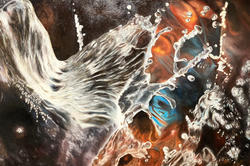The Career Center presents its annual RISD Mindshare lecture series, providing current students with real-world guidance about life after college.
Purpose and Principle

This fall, the Career Center hosted its annual Mindshare lecture series virtually, with dynamic talks by RISD alums Kelly Walters MFA 15 GD, Alexander Williams 06 FD and Qualeasha Wood 19 PR. “We created Mindshare to highlight the amazing stories of RISD alumni and their entrepreneurial journeys,” says Career Center Director Kevin Jankowski 88 IL. This year’s presentations focused on the importance of stepping out of one’s comfort zone, empowerment and building a business after art school.

Kelly Walters kicked off this year’s talks with a presentation about incorporating writing into her art and design practice while existing in the worlds of art and education as a Black woman. “So often, Blackness is defined for us as opposed to being defined by us,” says the founder of multidisciplinary design studio Bright Polka Dot. “We need to have a more eclectic and broader conversation about what our challenges are and be able to define that for ourselves.”
Walters did just that when she wrote Black, Brown + Latinx Design Educators: Conversations on Design and Race while teaching at Parsons School of Design. “This project was an opportunity for me to broaden my own understanding of how race, class, social structures and design institutions have informed what we are teaching,” says Walters. This year, she coedited The Black Experience in Design, a collection of visual essays, interviews, photographs and more that includes work by more than 70 contributors. “Writing is hard,” she noted during her talk. “You’re not sure what you want to say and you’re thinking about how to contextualize your work. But once you get through that process, the outcomes are amazing.”

Alexander Williams, founding partner of the independent lighting design studio RBW, spoke about cofounding the company with fellow alums Theo Richardson 06 FD and Charles Brill 06 FD and how their relationships have grown since college. Williams recounted meeting Brill during a trust-fall exercise on orientation day and befriending Richardson soon after. “Running your own company is an ongoing, ever-evolving journey,” says Williams, “and the learning process never really stops. You have to find a purpose and guiding principle and stick to them over time.”
“The learning process never really stops. You have to find a purpose and guiding principle and stick to them over time.”

Committed to sustainable manufacturing, the trio defines their products as “highly functional, adaptable engineering.” In the early stages of product development, they created Branch, a simple modular system made of perforated brass and photographic lighting papers. RBW aimed for the system to work with LED bulbs, a more sustainable form of light that had been criticized by other designers as too harsh.
In 2019, RBW demonstrated its commitment to excellence by becoming a certified B Corp, the designation for businesses that meet the highest standards of social and environmental performance, public transparency and legal accountability. The company has partnered with local nonprofits such as Kingston Land Trust to make land more accessible to surrounding communities through sanctuaries, heritage sites, food gardens and rail trails, and offers its employees a starting minimum wage of $20.50 per hour with extensive benefits. “As you go through these cycles of ups and downs you realize the importance of defining who you are,” says Williams. “Our purpose is to use light to positively transform environments, communities and lives.”

Qualeasha Wood wrapped up the Mindshare series with a talk about harnessing audacity and reframing its meaning. “My point tonight,” she said, “is that a good art career—or any career, really—is only as successful as you allow it to be. It’s important to give yourself back the power that the world so often takes from us.”
Throughout her presentation, Wood spoke of the many times that she was discouraged from moving forward in her art career by mentors and authority figures. “I leaned into that,” says the artist. “I became empowered by the idea of myself—a Black, queer woman—pushing people out of their comfort zones.” Wood credited her audacity for leading her to the work she is best known for now, creating tapestries of her own selfies. Recently, her piece The Black Madonna/Whore Complex (2021) was on the cover of Art in America before being purchased for the Metropolitan Museum of Art’s permanent collection.

“We are conditioned too much to believe other people’s perspectives over our own. At the end of the day, your art should make you happy and serve to help you feel better about existing in the world.”
Since graduating from the MFA program at Cranbrook Academy of Art, Wood has had the opportunity to test the limits of her work by designing a tapestry-covered trunk for Louis Vuitton and reimagining a sofa by European furniture design company Roche Bobois. “If I had believed the voices saying I wasn’t qualified, I never would have gone to RISD, or attended grad school, or had my work commissioned by The Met,” says Wood. “We are conditioned too much to believe other people’s perspectives over our own. At the end of the day, your art should make you happy and serve to help you feel better about existing in the world.”
—Isabel Roberts
Watch the recorded RISD Mindshare lectures.
December 13, 2022


